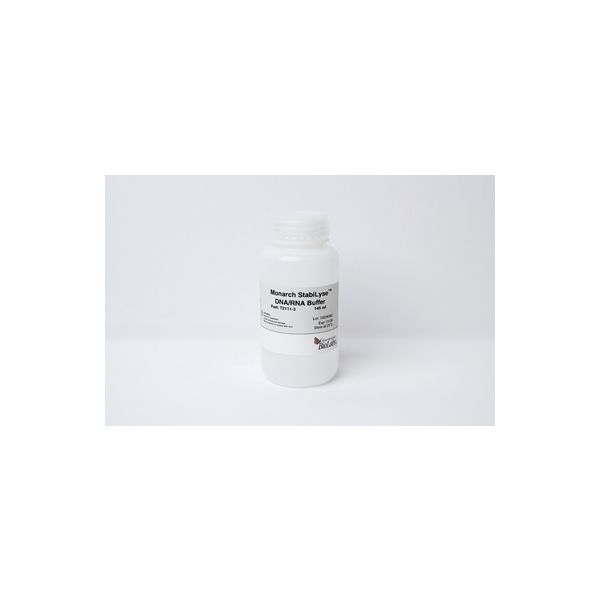The Monarch StabiLyse DNA/RNA Buffer is a dual-function reagent for nucleic acid stabilization and sample lysis. This proprietary formulation preserves the integrity of DNA and RNA in samples during storage and it also enables effective sample lysis from a wide variety of eukaryotic and prokaryotic sample types. Samples can be stored in the Monarch StabiLyse DNA/RNA Buffer at the point of harvest for short and long term without the need for immediate processing. The Monarch StabiLyse DNA/RNA Buffer is unique in that it does not require removal of this reagent or sample precipitation.
The Monarch StabiLyse DNA/RNA Buffer is ideal for performing sample homogenization and mechanical disruption. The extracted nucleic acids are suitable for a variety of downstream applications including PCR, sequencing, and more.
|
PROPERTIES |
|
|
Recommended use |
Storage reagent for nucleic acid preservation and for sample lysis |
|
Compatible with |
DNA and RNA extractions |
|
Sample precipitation/reagent removal before extraction |
Not required –preserved samples ready for further processing and downstream applications |
|
Sample storage recommendations |
At 25°C: up to 1 week |
|
Compatible with downstream applications |
PCR, sequencing, and more |
Mai multe informatii
| Price | 1.614,00 RON (preturile sunt fara TVA) | ||||||||||||
|---|---|---|---|---|---|---|---|---|---|---|---|---|---|
| Description |
The Monarch StabiLyse DNA/RNA Buffer is a dual-function reagent for nucleic acid stabilization and sample lysis. This proprietary formulation preserves the integrity of DNA and RNA in samples during storage and it also enables effective sample lysis from a wide variety of eukaryotic and prokaryotic sample types. Samples can be stored in the Monarch StabiLyse DNA/RNA Buffer at the point of harvest for short and long term without the need for immediate processing. The Monarch StabiLyse DNA/RNA Buffer is unique in that it does not require removal of this reagent or sample precipitation. The Monarch StabiLyse DNA/RNA Buffer is ideal for performing sample homogenization and mechanical disruption. The extracted nucleic acids are suitable for a variety of downstream applications including PCR, sequencing, and more.
|
||||||||||||

 English
English



